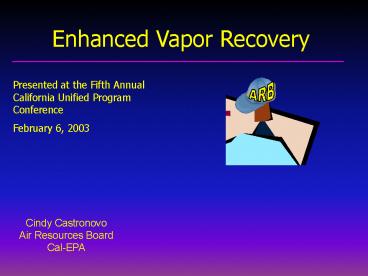ENHANCED VAPOR RECOVERY - PowerPoint PPT Presentation
1 / 34
Title:
ENHANCED VAPOR RECOVERY
Description:
What is ISD and how does it work? Is EVR applicable to all gasoline dispensing ... Other (extractor fittings, tool kits, etc.) 30. EVR Phase I Certified Systems ... – PowerPoint PPT presentation
Number of Views:275
Avg rating:3.0/5.0
Title: ENHANCED VAPOR RECOVERY
1
Enhanced Vapor Recovery
Presented at the Fifth Annual California Unified
Program Conference February 6, 2003
Cindy Castronovo Air Resources Board Cal-EPA
2
Outline
- Vapor recovery program background
- What is EVR?
- What is ISD and how does it work?
- Is EVR applicable to all gasoline dispensing
stations? - When will stations need to comply?
- What equipment may need to be upgraded?
- How much will it cost?
3
Vapor Recovery Provides Large Emission Reductions
ROG Reductions
(SCAB 2010 tons/day)
LEV
CBG
VR
4
Regulatory Roles
- California Air Resources Board
- Vapor recovery rulemaking
- Certifies Phase I and Phase II systems
- State Water Resources Control Board
- USTs, Overfill Prevention, Secondary
Containment - Develops regulations enforced by CUPAs
- Local Air Pollution Control Districts
- Permit GDFs and enforce vapor recovery rules
5
Vapor Recovery at Service Stations
Phase I
Phase II
6
EVR Modules
PHASE I SYSTEM
- Module 1 Phase I vapor recovery
PHASE II SYSTEM
Module 2 Phase II standards specs Module 3
ORVR compatibility Module 4 Liquid retention and
nozzle spitting Module 5 Spillage and
dripless nozzles Module 6 In-station diagnostics
(ISD)
7
Onboard Refueling Vapor Recovery or ORVR
8
ORVR - Phase II Incompatibility
9
In-Station Diagnostics (ISD)
- Identify failures automatically
- Notifies station operator
- Reduces emissions by early detection and prompt
repair - Supplements district inspections
- Concept similar to OBD for vehicles
- Tie-in to existing UST leak monitors
10
ISD System
11
ISD Normal Operation
12
Degradation Warning after Week One
13
Degradation Failure After Week Two
14
Gross Warning after Day One
15
Gross Failure After Day Two
16
Reset Button Activates Dispenser
17
Printout Available on Site
18
Sample Report
ISD Daily Report for December 12, 2002 Dispenser
1 Fail A/L .20Dispenser 2 Pass A/L
.96Dispenser 3 Pass A/L 1.05Dispenser
4 Pass A/L .82 Vapor Recovery System
FailFuel Delivery NonePressure Integrity
Status Pass Reset Button Pressed
12-12-02 1005 a.m.
19
ISD System Pilot Program
- ISD Workgroup formed
- Successful hands-off operation of five ISD
stations for two months - Passed challenge mode tests
- 99 detection
- no false failures
- ISD systems demonstrated
- feasible
20
Partial EVR Exemption for Districts in
Attainment with State and Federal Ozone Standards
- Exempt existing sites from all EVR modules except
ORVR compatibility - ORVR compatibility to minimize benzene exposure
- New and modified stations must comply
- Six northern CA districts qualify
21
(No Transcript)
22
ISD Exemption and Phase-In
23
EVR Implementation Dates
24
Current EVR Timeline
25
October Staff Proposal
26
Proposed EVR Timeline
27
Proposed EVR Timeline
Dotted box time between start of 4-year clock
and date required for new installations Start of
solid bar date required for new or modified
facilities End of solid bar date required for
existing facilities (installed before start of
bar)
January 2003
28
When Must I Upgrade to EVR?
- New Installations / Upgrades
- July 1, 2001 Phase I
- April 1, 2003 ORVR, Unihose
- October 1, 2003 Phase II, ISD
- Existing Installations
- April 1, 2005 Phase I, ORVR
- October 1, 2007 Phase II
- October 1, 2007 ISD (high thruput)
- April 1, 2008 ISD (medium thruput)
29
Phase I System Components
- Spill containers covers
- drain valves
- Rotatable product and vapor adaptors
- dust caps and drop tube
- Overfill prevention device
- ball floats or drop tube OPD
- Pressure/vacuum vent valve
- Tank gauge port components
- Other (extractor fittings, tool kits, etc.)
30
EVR Phase I Certified Systems
- Phil-Tite (VR-101-B)
- drain valve for product side
- ball floats for overfill prevention
- OPW (VR-102-A)
- product drain valve
- drop tube overfill prevention
- http//www.arb.ca.gov/vapor/eo.htm
31
Phase II System Components
- Dispenser associated vapor piping
- Control board
- Nozzles splash guards
- Hoses, break-aways, swivels
- Flow control units
- Vapor pump (for assist)
- Vapor processor
32
ORVR Compatible Phase II Systems
- Healy (G-70-186 and G-70-191)
- nozzle senses ORVR vehicle and turns off assist
vapor pump - SaberVac (G-70-196)
- air ingestion varies depending on pressure
differential across vapor pump - Balance (G-70-52, etc)
- no forced air ingestion
approval letter in February 2003
33
EVR Phase II Certified Systems
- Required for new installations beginning October
2003 - No EVR Phase II systems yet certified
- No EVR Phase II systems under test
- Expect testing to begin in February
- Will delay operative date if necessary to allow
more time to certify systems
34
Gasoline Stations (GDF)Rank by Volume Fuel
Dispensed
35
EVR Equipment and Installation CostsPer
Station(from Oct 2002 EVR Technology Review
Report)
36
EVR Contacts
- EVR Regulations - Cindy Castronovo
- ccastron_at_arb.ca.gov (916) 322-8957
- EVR Certification - Laura McKinney
- lmckinne_at_arb.ca.gov (916) 322-2496
- ISD and VR Test Procedures - Joe Guerrero
- jguerrer_at_arb.ca.gov (916) 324-9487
- Vapor Recovery Webpage
- www.arb.ca.gov/vapor/vapor.htm
37
Questions?






























